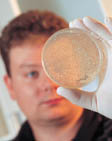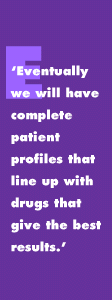 Mixing
and matching The combination of cell cycle modulators with conventional chemotherapy packs quite a wallop. "You kill a lot more cancer cells when you give both drugs, but they have to be timed at just the right moment. If you give cell cycle modulators before conventional chemotherapy, the results are worse than just chemotherapy alone. But if you give them after chemotherapy, you get much better results." Happily, cdk inhibitors work through pathways independent of p53, a tumor suppressor gene crucial to cell growth. In normal cells, p53 senses damage, stops cell activity and gives the cell time to repair itself. If the damage is too great, p53 triggers programmed cell death, or apoptosis. Apoptosis is a mech- anism that causes damaged cells to fall on their swords, so to speak, for the greater good of the organism. When mutated, p53 does not allow cell repair or cell death. Damaged cells keep making copies of themselves and the result, many divisions later, is cancer. Damaged or mutated p53 is found in about half of all cases of cancer and these malignancies resist conventional chemotherapy and radiation. But it takes more than just one mutation to cause cancer. The disease typically involves formulas of five to seven genetic abnormalities that develop over many years. With a two-year grant from the National Cancer Institute, Gumerlock is examining how four of these potential abnormalities respond to cell cycle modulators. Some patients may have one or more of these mutations, he adds. "We're going from looking at one abnormality in p53 to looking at genetic profiles," Gumerlock says. "Eventually, we will have complete patient profiles that line up with drugs that give the best results."
Home |
Table of Contents |
To our Readers |
Building on Basics UC Davis Health System | © 2000, 2001, 2002 UC Regents. All rights reserved. |
  |
